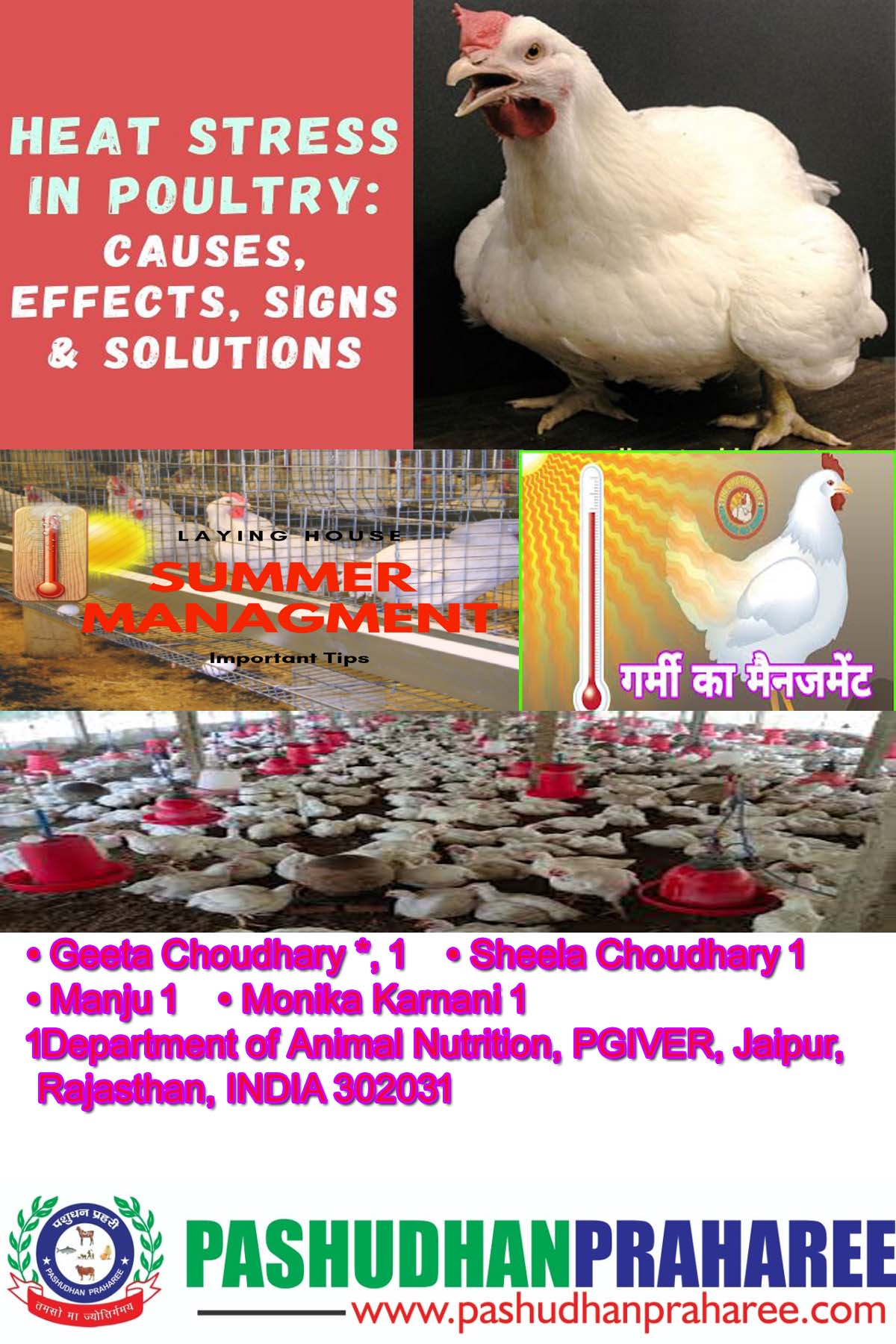SUMMER MANAGEMENT OF POULTRY
Introduction:
Poultry farming in summer is an important to understand because environmental stress causes adverse effects on the performance of the poultry. Heat stress negatively affects the welfare and productivity of broilers and laying hens. The detrimental effects of heat stress in poultry ranges from reduced growth and egg production to decreased poultry and egg quality and safety. Understanding and controlling heat stress in poultry is crucial to successful poultry production and welfare. Ideal temperature for poultry rearing is 18-28°C and temperature above which heat stress starts is 30°C.
Effect of summer on poultry performance:
- Rapid respiration/panting
- Prostration due to heat stroke
- Poor feed conversion efficiency
- Decrease in weight gain of birds
- Lowers resistance to disease
- Decrease in egg production
- Reduction in egg size, poor shell quality of eggs.
- Decrease in feed intake and increase in water intake.
- Increase in cracked egg, decrease in fertile eggs and reduced hatchability %.
Steps to combat heat stress in poultry farming in summer:
The aim of adopting measures to combat heat stress is to achieve targeted figures i.e. number of eggs from layer and a better body weight at particular age with specific food conversion ratio (FCR) in broilers.
Following steps will help to combat heat stress in poultry farming in summer: –
- Housing management
- Water management
- Feeding management
- General management
Housing management in poultry farming in summer:
- Orient the long axis of poultry house in east west direction to minimize solar heating and direct access to sunlight.
- Poultry house in tropics should have good roof insulation (if possible, with false roof to reduce the conduction of heat) with support of foggers and cooler systems.
- Increased air movement over the birds by cooler, fan/exhaust to produce a wind chill effect which cool birds even without drop in the house temperature.
- Shed design and construction should allow direct sunlight on birds.
- Thatching of roof with paddy straw or sugarcane leaves will reduce temperature inside the shed.
- The roof should be painted with white wash to reflect light.
- Shades from tall trees and plantation around the shed can reduce the radiant heat. The plantation of trees should be such that trees will be leafy during summer& bald during winter.
- Roof overhangs should be sufficient (3-5 ft) to protect the birds from strong sunrays.
Water management in poultry farming in summer:
Practically water is the most important criteria of these four management factors during summer. In summer water consumption is 3-4 times more. normally feed water consumption ratio is 1:2 but when temperature shoots beyond 95°F, this ratio may increase up to 1:4 or more.
Points to be taken into consideration: –
- Supply of plenty of clean & cold water must be insured.
- Use ‘Aqua cure’ in water to control infection through water.
- Cover water tanks with wet gunny bags to avoid direct exposure to sun.
- Increase frequency of watering.
- Addition of 0.25% salts to drinking water like sodium carbonate increase the water consumption.
- Do not withhold drinking water from flock when vaccine is provided through drinking water.
- In case of nipple drinkers, insulate nipple pipe with wet gunny cloths.
Feed management in poultry farming in summer:
- During summer consumption of feed by birds is reduced considerably leading to reduced body weight, egg production and shell quality.
- Increase the frequency of feeding.
- Do not offer feed during day time, offer feed during cooler part of the day (early morning and evening).
- Increase nutrient density of feed to compensate for depressed feed intake.
- Supplementation of limiting amino acids like methionine, lysine, threonine will give better results rather than supplying total proteins.
- 20- 30% extra vitamins and trace minerals should be added to feed.
- Vitamin C is antistressor & increase survivability of heat stressed birds. Supplementation of 200mg/kg of vitamin C in combination with vitamin E (125 mg/kg) or 1 gm ascorbic /litre of drinking water throughout heat period is recommended.
- Vitamin E act as antioxidant and supplementation of vitamin E @125mg/kg diet was beneficial to improve body wt. gain, breast & liver yield, immunocompetence, economic & overall welfare of broiler chicken during extreme hot conditions.
- Administration of vitamins like B2, B6, B12 have positive effects on body wt. & immunomodulatory effect under heat stress.
- Addition of ammonium chloride, potassium chloride and /or sodium bicarbonate have improved performance of broilers by improving water and feed intake.
- Use of probiotics-by controlling the corticosterol level and the excessive release of proinflammatory agents. Lactobacillus based probiotics enhance goblet cell count in duodenum and jejunum of heat stressed broilers thereby improving feed conversion ratio (FCR)
- Addition of multistrain probiotics (Lactiplantibacillus plantarum, L. bulgaris, L. acidophilus,) increase egg production and feed intake in poultry.
- To enhance increase in feed intake & prevent selective feeding, feed may be given in pelleted form.
- Since hot humid climate favors growth of mold/ fungi in feed so constant use of antifungal is recommended.
https://www.pashudhanpraharee.com/summer-management-of-poultry-birds-layer-broilers-3/
General management in poultry farming in summer:
- Depth of litter should be 2-3 inch on floor. Stir the litter regularly to prevent caking.
- 10% extra floor space should be provided in summer. overcrowding of birds must be avoided.
- Shifting, transportation, debeaking and vaccination should be done during night or cool hour of the day.
- Birds severely heat stressed may be dipped in cold water for 2-3 minutes keeping their head & neck above water level.
- Use foggers in shed which reduce the shed temperature up to 5-10°C depends upon quality.
- The house should be situated away from other buildings in order to facilitate free movement of air.
- https://www.thepoultrysite.com/articles/hot-weather-management-of-poultry
- Geeta Choudhary *, 1 • Sheela Choudhary 1 • Manju 1 • Monika Karnani 1
1Department of Animal Nutrition, PGIVER, Jaipur, Rajasthan, INDIA 302031



